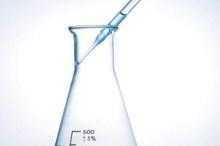What does fact checked mean?
At Healthfully, we strive to deliver objective content that is accurate and up-to-date. Our team periodically reviews articles in order to ensure content quality. The sources cited below consist of evidence from peer-reviewed journals, prominent medical organizations, academic associations, and government data.
- Clinical, Cosmetic and Investigational Dermatology: Fulvic Acid in Topical Treatment of Eczema
- Clinical, Cosmetic and Investigational Dermatology: Fulvic Acid in Topical Treatment of Eczema
The information contained on this site is for informational purposes only, and should not be used as a substitute for the advice of a professional health care provider. Please check with the appropriate physician regarding health questions and concerns. Although we strive to deliver accurate and up-to-date information, no guarantee to that effect is made.
Disadvantages of Fulvic Acid
Fulvic acid is a natural substance found in hummus that typically grows near water sources. It is a water-soluble substance produced by decomposing organic materials in the ground. The plant-derived material is one of many organic substances that make up humic acid. Plants absorb the substance, making the vitamins and minerals in the plants more absorbable. Because of the damage caused to the natural growing environment, people take supplements that contain fulvic acid to make up for the lack of the organic substance in the soil. While fulvic acid has advantages for human health, it has disadvantages in increasing the levels of the substance in your body.
Role
Fulvic acid plays a role in protecting your cells from oxidation that occurs from environmental toxins. It makes nutrients more soluble and available for use by the cells in your body. Fulvic acid is an antioxidant that fights off the damage incurred from free radicals that enter your body through the food you eat and through outside environmental toxins. It is an electrolyte that helps balance the minerals that drive neurons in your brain. Fulvic acid also plays a role in RNA and DNA synthesis that might result in serious consequences when you use the substance in large doses. Consult your physician before taking fulvic acid supplements to make sure they won’t interfere with any other condition you have or interact with other treatments or medications.
- Fulvic acid plays a role in protecting your cells from oxidation that occurs from environmental toxins.
- Fulvic acid is an antioxidant that fights off the damage incurred from free radicals that enter your body through the food you eat and through outside environmental toxins.
Consequences
Natural Source of Calcium Carbonate
Learn More
The consequences of taking fulvic acid supplements have not been thoroughly tested. Alternative-medicine practitioners and sports and exercise nutritionists often tout the remarkable abilities of the substance for increasing energy levels and reducing lactic acid buildup. Proponents of the supplement report that fulvic acid can increase the amount of oxygen delivered to your muscles as you exercise, decreasing muscle pain 1. However, the reports of its effectiveness are mostly anecdotal, and even fulvic acid enthusiasts -- such as nutritionist Peter Gouge at Complete Nutrition Ireland -- say more thorough studies are needed to support claims. Supplements cannot replace a balanced diet and proper exercise techniques, though supplement marketers often say they can.
- The consequences of taking fulvic acid supplements have not been thoroughly tested.
- Alternative-medicine practitioners and sports and exercise nutritionists often tout the remarkable abilities of the substance for increasing energy levels and reducing lactic acid buildup.
Considerations
The benefits you derive from taking fulvic acid supplements or external applications used for wound healing are tied to preventing diseases, according to Sisel International. Once bacteria enter a cell, the damage cannot be undone by the introduction of fulvic acid. At the same time, taking fulvic acid supplements after you’ve contracted a virus can stop the virus from reproducing, reducing the effects of the diseased cells.
Side Effects
How to Treat an Acid Skin Burn
Learn More
When fulvic acid is formulated into a compound for application to the skin, it can successfully be used to treat eczema, according to a report in "Clinical, Cosmetic and Investigational Dermatology." The anti-inflammatory properties of the substance reduce the itching associated with the skin condition 12. However, it causes a burning sensation when applied. Fortunately, the pain fades shortly after the substance touches your skin.
- When fulvic acid is formulated into a compound for application to the skin, it can successfully be used to treat eczema, according to a report in "Clinical, Cosmetic and Investigational Dermatology.
- " The anti-inflammatory properties of the substance reduce the itching associated with the skin condition 1.
Related Articles
References
Writer Bio
Linda Ray is an award-winning journalist with more than 20 years reporting experience. She's covered business for newspapers and magazines, including the "Greenville News," "Success Magazine" and "American City Business Journals." Ray holds a journalism degree and teaches writing, career development and an FDIC course called "Money Smart."









